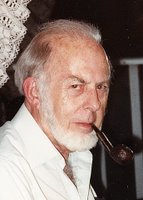A Stroll at Daybreak
 There are times when something occurs that doesn't make sense, that can't be explained through logic. Usually such incidents are quickly forgotten, but not always. Sometimes a thought or a vision is permanently implanted in your mind and never goes away. The one that follows is a case in point:
There are times when something occurs that doesn't make sense, that can't be explained through logic. Usually such incidents are quickly forgotten, but not always. Sometimes a thought or a vision is permanently implanted in your mind and never goes away. The one that follows is a case in point:Combat heightens a man’s awareness of all that is around him; small things like sounds and shadows, large ones like the gradual changeover from night to day. Dawn is the hour of attack, a time to be especially alert, but it isn’t like throwing a switch and having a room light up around you. Instead it creeps up, sometimes shrouded in mist and sometimes sparkling clear, but always slowly with shadows becoming objects and bands of darkness taking on the shape of trees and fences and buildings. In Normandy what had been a black mass across the field little by little became a hedgerow with trees and underbrush rising from its top, foliage clinging to its front and men who would remain unseen waiting and watching on its far side. That is a major part of war, men watching from a place of concealment to see what other men will do.
At first light on a July morning near Sainteny, mist swirled in the field ahead and birds hidden in trees and undergrowth chirped tentatively, aware that all was not as it should be in their world. Half the men in G Company still slept while the others leaned against the hedgerow peering out over the field, rifles lying close at hand.
Muscles tensed as a German walked leisurely and without concern through a break at the right end of the hedgerow fifty yards away. The young soldier had left his helmet behind and his weapon as well. Was it some sort of trick? The Germans were experts at that, doing something out of the ordinary to keep you off balance or to draw your attention away from something more important. But they were not suicidal, so it couldn’t be that. He had to have believed there was another field between him and the enemy and no one had put him the wiser. It was a mistake on his part, a deadly mistake.
He ambled along in front of the far hedgerow, pausing once or twice to look at something growing from its side. Why didn’t the men on the other side call to him so he could drop down and try to crawl away while they delivered covering fire? Surely they must have seen him, or had they withdrawn during the night? When he paused again to examine something that caught his eye, the final scene in the movie version of “All Quiet On the Western Front” leaped to mind, but then it had been a butterfly that attracted the attention of actor Lew Ayres in the role of Paul Baumer.
Along the line rifles were picked up. For once there was time to take careful aim. No command was issued, yet everyone fired at the same instant. The young German was slammed against the hedgerow before slowly slumping to the ground. For a moment he continued to move a little, then someone put another bullet through his head.
Men who had been sleeping leaped up from their slit trenches, grabbing their rifles and joining those at the hedgerow, then quickly ducking down again as the Germans opened fire. They had not withdrawn, so how had they missed seeing their comrade in the act of making a fatal error?
It fell silent again as those on both sides of the line realized it was a false alarm and nothing was happening. Men lit cigarettes or broke open gray K-Ration boxes labeled “Breakfast.” Waxed inner containers that burned with neither flame nor smoke were set afire so that coffee could be heated and small cans of processed eggs with apple flakes could be warmed before eating.
Jimmy Hewston, a rifle squad leader, brushed the sleep from his eyes and said, “What in hell was that all about?”
“A Jerry walked out in the field,” someone told him.
Jimmy looked over the hedgerow to where the body of the young German lay. He turned again, grinning, and said, “I’ll be damned. Decided to take a stroll, did he? Crazy bastard should have known better.”
visit: www.dickstodghill.com


0 Comments:
Post a Comment
<< Home